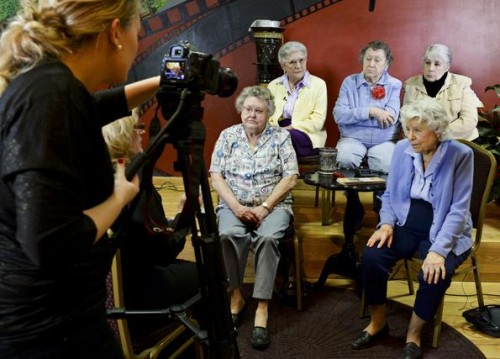
Filmmaker Ashley Maria (left) interviews women who worked as Rosie the Riveters during World War II. Front row: Maxine Marshall (left) and Dot Finn. Back row: Buddie Curnutte (left) and Agnes Smith (middle). Anne Montague (back row, far right) grew up during the war and is founder of the West Virginia Rosie the Riveter Program.
CHARLESTON, W.Va. — When the United States called on millions of women to take over the jobs of men leaving to fight World War II, Buddie Curnutte, Agnes Smith, Dot Finn and Maxine Marshall answered the call.
“There were posters pasted everywhere,” recalled Smith, a Nitro resident who during the war worked in a plant chrome-plating piston rings. “It was Uncle Sam pointing at you.”
Smith, Curnutte, Finn and Marshall thought it was their patriotic duty to go into the factories and work so the men could fight.
But filmmakers Ashley Maria and Lea-Ann Berst believe the women, who became known by the ubiquitous nickname “Rosie the Riveter,” did far more than that. Berst said Rosies all over the country showed what women could do in the workplace, passed on to their own daughters the idea that a woman could work outside the home and paved the way for subsequent generations of working women.
Maria, a Los Angeles-based film director was in South Charleston on Monday with Berst, a producer who is also her mother, to interview the women for a documentary film titled “Pioneers in Skirts.” Curnutte, Smith, Finn, Marshall and West Virginia Rosie the Riveter Program founder Anne Montague were at the LaBelle Theater to talk about women’s experiences during the war and afterward.






